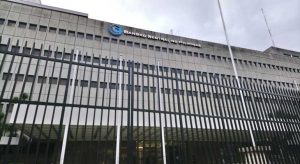




Inflation Update: Nowhere but up
 DOWNLOAD
DOWNLOAD

Philippines Trade Update: Imports weaken on tepid demand
 DOWNLOAD
DOWNLOAD

Policy Rate Updates: BSP outlook — cloudy with a chance of rate cut
 DOWNLOAD
DOWNLOAD


BSP policy rate could reach 6.5% this year

THE BANGKO SENTRAL ng Pilipinas (BSP) could hike benchmark interest rates by 50 to 100 basis points (bps) this year to bring down inflation and match the US Federal Reserve’s monetary tightening in support of the peso.
“The BSP will probably continue to hike as long as the Federal Open Market Committee (FOMC) continues to hike to avoid a repeat of the exchange rate-led inflationary episode in 2022,” Bank of the Philippine Islands (BPI) Lead Economist Emilio S. Neri, Jr. said in a Viber message.
“Our latest estimate is between 6% and 6.5% for the policy rate. This assumes significant weakening of the US economy in early 2023 causing wage increases there to fall significantly,” Mr. Neri said.
The Philippine central bank hiked borrowing costs by 350 bps in 2022, bringing its key rate to a 14-year high of 5.5% from a record low of 2% in 2021.
Meanwhile, the Fed raised rates by 425 bps last year, bringing its own policy rate to 4.25-4.5%. Fed policy makers have said the US central bank will continue tightening this year to battle inflation.
“Unfortunately, if US wage growth remains elevated until mid-2023 the FOMC’s hiking cycle may end much later than what markets currently expect and will mean an even higher terminal rate for the BSP,” Mr. Neri said.
He also noted that if the FOMC pauses its policy tightening this year, and if Philippine inflation falls within the 2-4% target range, the BSP may consider a pause in hikes.
BSP Governor Felipe M. Medalla this month signaled more rate increases at the BSP’s first two policy meetings this year to ensure inflation will fall within the central bank’s target range. The first policy meeting for the year is scheduled on Feb. 16.
“If inflation stays within target for one quarter or so maybe BSP can also consider cutting. Hopefully they’ll cut the RRR (reserve requirement ratio) and rebuild their external buffers first before they reduce the RRP (overnight reverse repurchase) rate aggressively,” Mr. Neri added.
The BSP earlier committed to bringing down the RRR of big banks to single digits by this year. The RRR for big banks is currently at 12%, one of the highest in the region. Reserve requirements for thrift and rural lenders are at 3% and 2%, respectively.
“We think the BSP will raise total of 50 bps this first-quarter 2023. Inflation remains a key risk in the first semester, but is expected to moderate and fall within target in the second half,” Security Bank Corp. Chief Economist Robert Dan J. Roces said in a Viber message.
“Having said that, the BSP will want to make sure that inflation is not a threat by the end of the year and that means a long pause before a rate cut in early 2024,” Mr. Roces added.
Headline inflation rose to 8.1% in December from 8% in November, as food prices soared during the holidays. This brought the average inflation in 2022 to 5.8%, matching the BSP’s forecast for last year.
The BSP expects inflation to average 4.5% this year before easing to 2.8% in 2024.
NEW BSP GOVERNOR
Meanwhile, an analyst said potential leadership changes in the BSP this year cloud the rate outlook.
“Calling BSP policy rates this year will be tricky given that Governor Medalla will retire by midyear. Entering his 12th year as a member of the Monetary Board, Medalla may not be eligible for reappointment as BSP Governor to a fresh a term,” ING Bank N.V. Manila Senior Economist Nicholas Antonio T. Mapa said in an e-mail.
“We do, however, expect Medalla to hike policy rates by 25-50 bps in the first half of the year, with the decision to push the RRP to 5.75% or 6% contingent on the performance of the peso and inflation,” Mr. Mapa said.
He said if the peso remains stable and inflation eases “quickly,” the BSP may opt for a smaller 25-bp increase.
“If the peso faces renewed depreciation pressure and inflation stays sticky, Medalla may opt to match with 50 bps worth of hikes in the first half of the year,” Mr. Mapa said.
“The second half of the year will be another story as the direction and stance of the BSP may be very dependent on who will be replacing Medalla as Governor,” he added.
Meanwhile, Pantheon Macroeconomics Chief Economist for Emerging Asia Miguel Chanco said in an e-mail that moving forward, the BSP could cut benchmark interest rates by 50 bps in the fourth quarter this year on expectations of easing inflation.
“We’re likely to see inflation fall to much comfortable levels by yearend, and we suspect it is only a matter of when, not if, economic growth starts to notably lose momentum,” Mr. Chanco said. — Keisha B. Ta-asan
This article originally appeared on bworldonline.com





 By BusinessWorld
By BusinessWorld